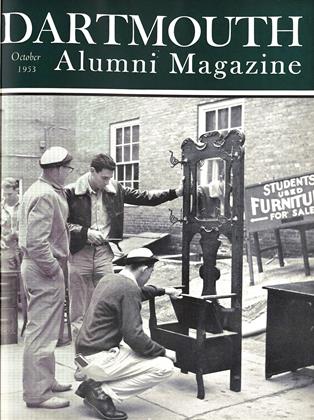This column begins my twentieth year as Hanover Browser, and I hope to be able to give my readers a few good tips on books that are worth reading throughout the coming year.
This summer produced a book which I recognized at once as literature, and which I think is the finest book I have read this year. This is Maurice O'Sullivan's TwentyYears A-Growing, which came out first in 1933, and which has now been republished with an introduction by E. M. Forster in the Oxford World's Classics.
This is a translation from the Irish, marvellously made by the late Moya Llewelyn Davies, and George Thomson. It is the story of a boy's upbringing on the now desolate island of Blasket, off the Kerry Coast in Ireland. O'Sullivan never wrote another book but this will give him immortality in Irish literature. He was drowned in 1950 in Galway at the age of 46. The book has a remarkable gift of style derived primarily from folk-tales which he heard at the fireside from his grandfather, but it is sharpened by his own ear for words and by his own lively and poetic imagination. Today the old women of the island are gone, and the life he describes is a thing of the past. If you care to know what really great literature is, compared to the commonplace stuff that our presses feed us, read this little gem . . . and exult that such a book is still possible in this mad but beautiful world of ours.
Carl Bridenbaugh '25 has edited a book which has just come to my attention and which I find delightful. This is called Gentleman's Progress and is "The Itinerarium of Dr. Alexander Hamilton," who made a trip on horseback (and boat) in 1744 from Annapolis to York, Maine, and as far north as Schenectady, New York. It is full of curious observations and this one I am particularly fond of: "They grew very loud upon it as they put about the bowl, and I retired into a corner of the room to laugh a little, handkerchief fashion, pretending to be busied in blowing my nose; so I slurd a laugh with nose blowing as people sometimes do a fart with coughing." This altogether charming book was published in 1948 for the Institute of Early American History and Culture by the University of North Carolina press.
The reader who still likes Kipling (and what reader doesn't who knows his work?) will find that Maugham's Choice of Kipling's Best (Doubleday) is a most satisfactory volume, though the choices will not please everybody as some favorite is sure to have been omitted. However, here are sixteen of Kipling's best stories, and the book has a typical Maugham introduction, which is to say, suavely put, eloquent, and always a little superior. Definitely good.
Sally Carrighar's Icebound Summer (Knopf) is in a class by itself as superb observation of nature. Here you will find in clear and sometimes icy prose the fantastic story of the lemmings whose death wish is equalled only by that of whole nations today. The whole arctic summer is recreated for you in an unforgettable manner. A book to buy.
I also stumbled this summer onto Siegfried Sassoon's biography of Meredith, issued in 1948 by the Viking Press, and found myself once more entranced by Meredith's life and by his novels. I do not know what of his I will read again, save his memorable book, An Essay onComedy, but I am sure that sometime I will read again his Evan Harrington, his Harry Richmond, and perhaps Diana ofthe Crossways.
Kenneth Roberts in The Seventh Sense hammers his doubters into submission with a dowsing rod that would have fitted the enormous hands of Paul Bunyan. In a book bristling with facts, he jibes at water-geologists and tells the story of Water Unlimited Inc., of which he and Henry Gross are the main characters, ably assisted by Mrs. Roberts who is the amanuensis and, I suspect, provides the light touch needed in this most worthy enterprise.
We are now living in an age of reprints, for which I am immensely grateful. Anchor Books has added some excellent titles such as George Santayana's Three Philosophical Poets, Edmund Wilson's To theFinland Station, and Mark van Doren's Shakespeare. Also others of quality.
 View Full Issue
View Full Issue
More From This Issue
-
 Article
ArticleMr. President, LL.D.
October 1953 By EDWARD CONNERY LATHEM '51 -
 Class Notes
Class Notes1918
October 1953 By ERNEST H. FARLEY, W. CURTIS CLOVER, RICHARD P. WHITE -
 Article
ArticleThe Faculty
October 1953 By Harold L. Bond '42 -
 Class Notes
Class Notes1926
October 1953 By HERBERT H. HARWOOD, H. DONALD NORSTRAND, CARLETON BLUNT -
 Class Notes
Class Notes1912
October 1953 By HENRY K. URION, FLETCHER CLARK JR., HENRY B. VAN DYNE -
 Class Notes
Class Notes1948
October 1953 By FRANCIS R. DRURY JR., JOHN S. FENNO
HERBERT F. WEST '22
-
 Article
ArticleSuggestions
February 1940 By HERBERT F. WEST '22 -
 Article
ArticleHanover Browsing
November 1940 By HERBERT F. WEST '22 -
 Article
ArticleHanover Browsing
March 1949 By HERBERT F. WEST '22 -
 Books
BooksOWEN GLEN
October 1950 By Herbert F. West '22 -
 Article
ArticleHanover Browsing
April 1952 By HERBERT F. WEST '22 -
 Article
ArticleHanover Browsing
April 1956 By HERBERT F. WEST '22
Article
-
 Article
ArticleTHE UNDERGRADUATE CHAIR
March, 1926 -
 Article
ArticleFaculty Articles
December 1952 -
 Article
ArticleA Closer Look
Jan/Feb 1981 -
 Article
Article1876*
May 1939 By DR. HENRY H. PIPER -
 Article
ArticleThe Privately Endowed Institution
January 1938 By LEON BURR RICHARDSON 'oo -
 Article
ArticleThe Undergraduate Chair
February 1956 By RICHARD L. GORDOIN '56


